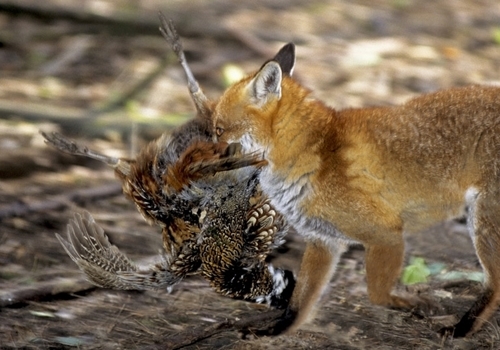Q: Why is fox control important for the conservation of our game and wildlife?
A: Wild ground-nesting birds like black grouse, partridge, lapwing and curlew are particularly vulnerable to predation by foxes, as are brown hares. Several of these are species of conservation concern; others are game species; some are both. In order to protect vulnerable species while they are breeding, gamekeepers aim to control fox numbers, particularly from late winter to early summer. Foxes are also controlled around pheasant and partridge rearing and release pens in late summer and autumn.
Q: So are foxes solely to blame for the decline of wild bird populations?
A: No. However, where ground-nesting bird populations have already been reduced due to a change in land use, generalist predators can prevent their recovery – even when the habitat has been improved. This is why some conservation projects involve reducing the local fox population.

Photo credit: David Mason
Q: Why do farmers control foxes?
A: To prevent the predation of lambs, piglets reared outdoors, and free range and domestic poultry by foxes.
Q: Have the UK fox population and the number trapped in snares been estimated?
A: Yes. The best estimate of the British fox population is 240,000 adults in the spring (1995), to which a production of 425,000 cubs is added annually. Therefore, for the population to remain stable, 425,000 foxes would have to die each year. Some die naturally (including disease), and in the past there would have been less food, as well as their own predators – wolves, lynx, golden eagles and eagle owls – reducing numbers. Today an estimated 100,000 per year are killed by cars. Gamekeepers probably kill 39,000, of which some 25% are estimated to have been trapped in snares.
Q: Why has the fox population benefited from the way we have changed our land use?
A: In 19th Century Sweden there was a spectacular rise in fox abundance as wolves and lynx were extirpated. However, if we restored these apex predators in the UK, the relationship they would have with foxes would almost certainly not be that which they had before, because the landscape and how we use it has changed. In this country apex predators were long ago removed and we have changed how we use the land, so there is more food available than before. This has allowed some generalist predators, like the fox, to achieve a level of abundance that can be a significant detriment to some of their prey species.